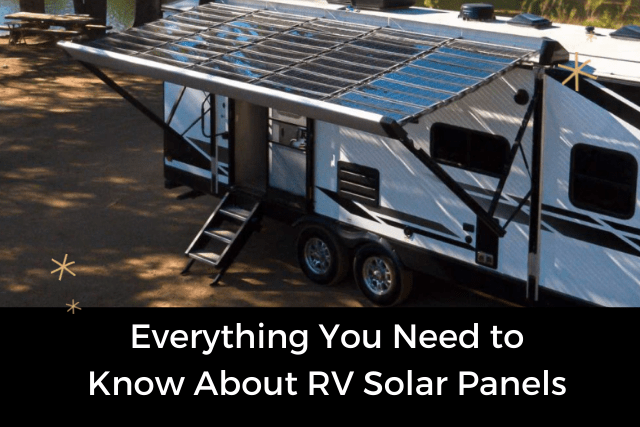Hooking up an R.V. solar panels system can give you the freedom to use your recreational vehicle (R.V.) wherever and whenever you like, without relying on outlets and power sources available in certain places only. While the benefits of R.V. solar panels are pretty clear, what’s not so obvious is how they work or how to install them yourself; here’s everything you need to know about R.V. solar panels and how they work!
What are solar panels for R.V.s?
A solar panel for your rv will help you cut down on your energy costs by producing clean and renewable energy for your home. There are two main types of solar panels: monocrystalline and polycrystalline, each with distinct pros and cons. Go to the Mr RV Exert and learn about how they work before deciding which is best for you.
Are all rv solar panels created equal
There are a variety of solar panels, and they all have their upsides and downsides. Whether you’re looking at buying solar panels for your recreational vehicle or want to learn more about them, here’s what you need to know.
Keep in mind that it’s always best to consult with a professional solar installer before making any decisions. Choosing the wrong panel could result in spending too much money for too little power or getting something you don’t need. What is an rv solar panel: R.V. solar panels are also known as off-grid solar panels since they typically produce electricity without connecting wires from a nearby electrical grid.
Where to install your panels?
The first step in deciding where to install your solar panels is ensuring that you have a place for them. On older R.V.s, one of your options will be to mount them on top of your coach and angle them towards sunlight, but many new models use special towable designs that don’t have room for mounting.
The other option is installing solar panels on your tow vehicle or choosing a model with built-in batteries and an integrated panel system. You’ll need enough battery storage capacity (usually in 12-volt D.C. batteries) to provide power at night or during overcast days—these battery types can’t produce energy from just sunlight alone.
Choosing between lithium-ion or lead-acid batteries
The age-old question of lithium-ion or lead-acid for your battery bank is a big one. While many people choose lithium because it’s lightweight and compact, and some swear by its ability to withstand high temperatures better than other batteries, some love lead acid because it’s tried and true.
Ultimately, choosing between these two types will come down to what you need from your system and how much money you spend. We break down both so that you can make an informed decision based on cost, convenience, and performance.
Frequently Asked Questions
How many solar panels do I need to run my R.V.?
The common question is, How many solar panels do I need to run my R.V.? The simple answer is one panel will only provide power for a small portion of your camper or trailer. If you want any real degree of independence, you’ll need enough panels to keep at least one battery bank up while recharging others.
This means at least two, but if you want more independence, it’s worth considering three or even four and a larger capacity battery bank and charge controller. That way, even if one set of panels doesn’t have time to recharge a battery before the sun sets, another might be able to take over, so you don’t lose running lights or refrigeration (depending on where you’re boondocking).
Are solar panels for an R.V. worth it?
There are many reasons why you might want solar panels for your R.V., and that’s because they’re good for both your bank account and your planet. If you have an R.V. with batteries, for example, installing solar can be one way to help recharge them during free time, so you don’t have to be as dependent on campgrounds that might charge extra fees.
But installing them isn’t just about how much money you’ll save on fees–it’s also about cutting down your carbon footprint. The average U.S. citizen consumes more energy than most people in any other country, contributing significantly more carbon emissions to our planet’s atmosphere than those who live elsewhere.
What do you need for R.V. solar system?
If you want to run your solar power system in your R.V.s, you must understand how solar panels work. Going off-grid might seem like a daunting task if you are used to getting electricity from plugging things into an outlet. But it’s not all that complicated; it will just take some time and effort on your part to learn how everything works together. So let’s jump right in!
What will a 200 watt solar panel run in an R.V.?
A 200 watt solar panel can power many of your appliances, such as a television, radio, computer, and lights. Your camper batteries are an energy source for all of your electrical needs in an R.V.
The larger your battery bank is, the more power you have access to while on the go. A basic 200 watt solar panel with a 60 amp-hour battery bank can give you a good range of hours before you need to plug into an outlet. However, traveling for long periods or camping in areas with minimal sunlight during certain times of year will decrease that range significantly.
Final Thoughts
There are many advantages of going solar. It’s a clean, renewable source of energy that can reduce your electricity bills while helping us move towards a cleaner, more sustainable energy future. We hope you can learn even more about solar panels and how they work in an easily digestible format with access to professionally written and easy-to-understand articles like these. Contact us today for more information on residential solar systems or ways to offset your home’s carbon footprint!



